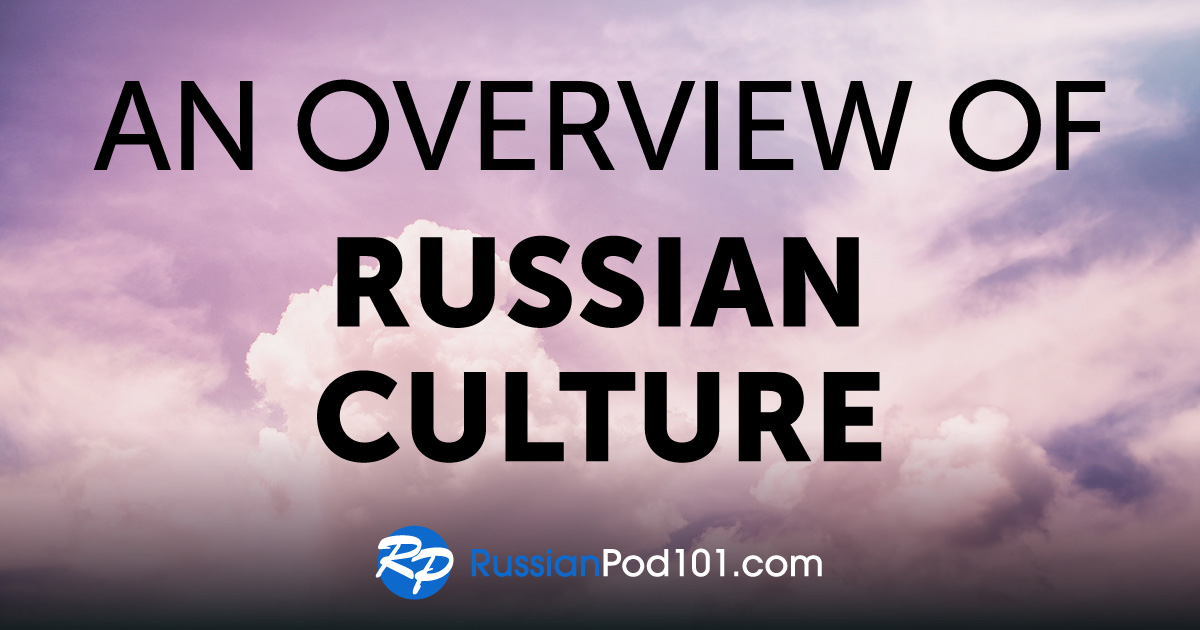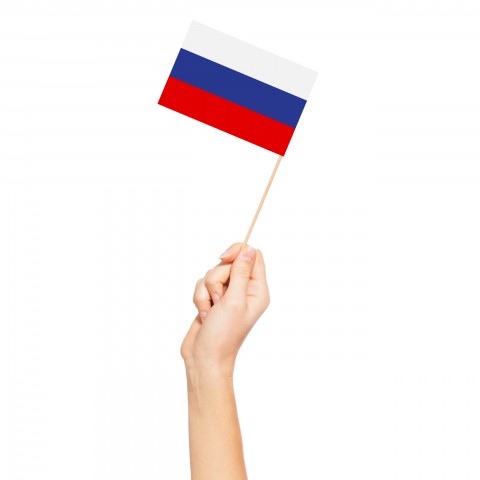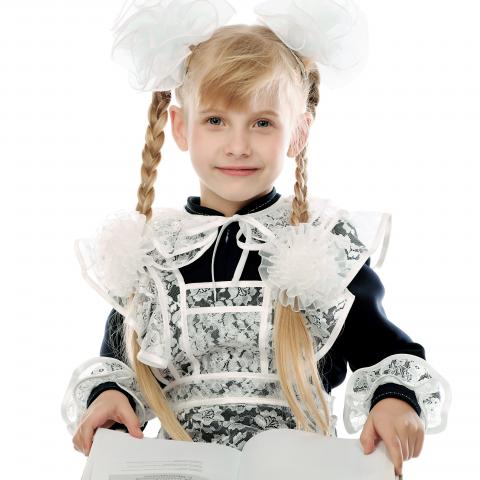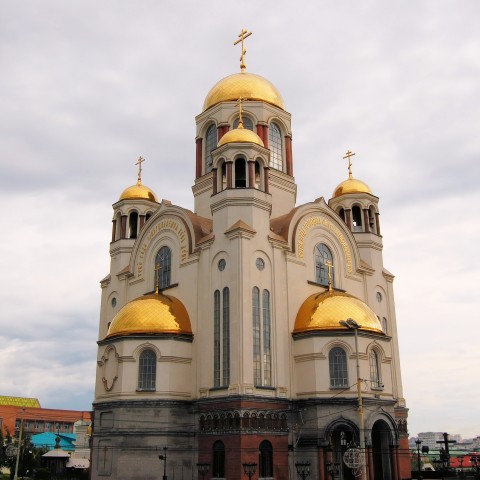
What images come to mind when you hear the word “Russia”?
Russia is known for its large territory and cold winters. But, digging deeper, what is Russian culture like?
Art and literature enthusiasts may be familiar with our world-famous ballet and our prominent writers: Alexander Pushkin, Leo Tolstoy, Fyodor Dostoevsky…
Sports lovers may acknowledge our hockey team and outstanding performances at the Olympics.
Those who are into science must already be familiar with our space activities as well as our massive oil and gas industry.
And gamers: you know Tetris, right?
Perhaps you’ve already learned something new just from reading this Russian culture introduction. But if you want to find out how Russians live, interact with each other, and spend their free time, the following overview of the Russian culture will help you get a bigger picture. You’ll see: Russia is not only about bears and vodka!
 Table of Contents
Table of Contents
1. Numbers and Facts

The Russian flag has three colors.
White for nobility and frankness, blue for faithfulness and honesty, and red for courage, generosity, and love.
Let’s warm up with some interesting Russian culture facts!
Russia is the largest country in the world in terms of territory. While it’s not all permafrost and tundra that’s unfit for human life, it’s still one of the least densely populated developed countries in the world. The current population is only 144 million people.
However, Russia can still boast of its vast cultural diversity, being home to nearly 200 ethnic groups, according to the CIA. Russian is the most common group (77.7%), and other ethnic groups include Tatar, Ukrainian, Bashkir, Chuvash, Chechen, and others.
Due to this population diversity, there are various languages spoken in Russia. Of more than 100 languages used throughout Russia, Russian is the most widely spoken. It might come as a surprise, but Russian has very few dialects. To be precise, there are some well-distinguishable accents like the one from Moscow or Kuban in southern Russia. But it’s usually impossible to tell where a person is from just by listening to them talk.
2. Relationships
A key component in understanding Russian culture is learning how people interact with each other. Let’s go over what Russian relationships look like at home and at work!
A- Family
The legal marriage age in Russia is 18 years old for both men and women. Monogamy is the only form of relationship recognized in Russia. Same-sex marriage is not allowed.
Nowadays, most couples prefer to move in together to dip their toes into real family life. Even though more and more couples prefer to just live together without engagement, the institute of marriage is still going strong in Russia, meaning most couples will end up marrying after all. Unfortunately, the current divorce rate in Russia is 52%.
The child-free spirit is not widely supported. Most people still expect a married couple to have a baby, and some couples might even experience pressure from their relatives or peers. Thirty years ago, it was normal to have your first baby at 20-22; nowadays, the mothers-to-be prefer to do it later.
The government is trying to stimulate childbirth in the country by offering monetary payments to new parents. Starting in 2020, couples will receive a one-time payment for their first child equal to almost 40 minimum monthly wages in Russia. Before 2020, you could only get this payment for the second child in your family.
The state offers a generous maternity leave as well: up to 3 years, 1.5 years of which are paid. For this reason, mothers prefer to go back to work when their baby is 18 months old. At this point, they will find a babysitter or nursery to look after their offspring. It’s also a common practice to ask one’s parents to babysit. Most of them don’t mind spending time with their grandchildren anyway!
Property in Russia is expensive considering the local salaries, so many children stay with their parents even as adults. Charging one’s children rent is extremely uncommon—if they could afford rent, they would already have moved out to live on their own. However, children often offer financial support to their families by purchasing the groceries and such. There is also the expectation that kids will look after their parents when they become old or can’t take care of themselves.
- → Brush up on some relevant vocabulary with our Family vocabulary list!

When Russians marry, they put a wedding ring on the right hand.
When they divorce, they put it on the left.
B- Work
In Russia, one is legally allowed to work when they turn 16 (in some cases 14). Many people start working at the age of 22-24 after graduating from university, and around 50% of students combine their studies with a part-time job. Surprisingly, only less than half of all graduates work in their degree field after leaving their alma mater.
Many Russians are dissatisfied with their jobs. It’s pretty common to hear someone complaining about their boss and salary. Very few people follow their hearts and truly enjoy what they’re doing.
As for Russian work etiquette, one piece of advice will be especially useful: learn how to be punctual. It’s strongly advised to arrive at a meeting or an interview on time, or even ten minutes in advance. If you’re going to be late, it’s better to call the person to warn them.
Another crucial aspect of Russian culture in business is that you should address people formally.
➤ After reading our article about doing Business in Russia, you’ll have a better idea of how formal language differs from informal language.
Patronymic names are one feature of ‘formal’ Russian that will be new to you. Whenever you talk to your boss, teacher, doctor, etc., you should address them by their first name + their patronymic name. The patronymic name is derived from the person’s father’s name:
- m: Иван Сергеевич — Ivan (name) Sergeyevich (patronymic)
Ivan’s father’s name is Sergey. - f: Марина Викторовна — Marina (name) Viktorovna (patronymic)
Marina’s father’s name is Viktor.
Most male patronymic names end in -vich, while most female patronymic names end in -vna.
➤ Learn more about male and female patronymic names in our lesson “Introducing Your Boss to a Client.”

A typical work week in Russia is 40 hours, five days per week.
14 days of public holidays together with all the weekends give Russians 118 days off work each year.
Also, most workers have an average of 28 vacation days per year.
3. Education
You already know from the previous chapter that the maternity leave in Russia can last up to 3 years. After that, the majority of parents enroll their children in kindergarten. However, the number of free public kindergartens fell drastically in the 90s, so now there are far more children than places available. This results in extremely long waiting lists, and many parents stake a place for their children the moment they’re born!
The primary school welcomes children aged 6 or 7 years old. Parents usually enroll their children in the school closest to their home. In Russia, education in primary and secondary public schools (a total of 11 years) is free for everybody.
Russian schools use a 5-point system for grading. It ranges from 5 (“excellent”) to 2 (“unacceptable”). The lowest score, 1 (“a total failure”), is hardly ever used.
In Russia, students often have no choice in what subjects they focus on later in their studies: everybody follows the same curriculum. However, after 9 years of schooling, children can choose to stay in school for 2 more years to complete their secondary education or to transfer to a training-type school that specializes in an area of choice (construction, metalwork, electricity, secretarial practice, etc.). Very few teens decide to drop their studies at this point, and students who intend to apply to university should finish the full 11-year school program.
At the end of the 11th grade, all students are required to pass the Unified State Exam (USE), which includes two obligatory subjects: the Russian language and Math. Students can then apply to a university with these results, so they strive to pass the test with flying colors. Depending on the entry requirements for their specialty of choice, students can opt for tests on other subjects as well (literature, foreign language, history, etc.).
Going to university after school is a popular choice in Russia. According to OECD, around 65% of adult Russians have a college degree. Higher education is not free for everybody, though. Depending on the specialty, there is a limited amount of state-funded places reserved for those with high USE scores and beneficiaries (such as veterans, orphans, and disabled people). Since 2010, there are three types of university degrees: Bachelor’s degree (4 years), a Master’s degree (2 more years), and postgraduate degrees.

Many Russian schools require their students to wear a uniform.
However, it doesn’t have a unified look, so each school decides on its own dress code.
The girl in the image is dressed in a uniform worn during Soviet times.
4. Religion
The dominant religion in Russia is Orthodox Christianity. Over 70% of the population identifies as Russian Orthodox Christian. In Russian culture, however, religion does not play a large role in most people’s lives. Most believers don’t attend church regularly, limiting their religious activities to baptizing their kids at a nearby church and attending funerals.
Majestic Russian Orthodox churches attract visitors from all over the world, but even foreign tourists are recommended to follow the traditional rules when visiting. To begin with, men must remove any headgear; their heads must be uncovered at all times. Women must cover their hair and wear long skirts, certainly not trousers. If you arrive wearing trousers or shorts, some churches might offer you a large piece of cloth at the entrance to wrap around your legs, even if you’re a man. You’ll also see people crossing themselves three times from right to left before entering and leaving the church.
A considerable difference between a Russian church and a Western one is that the Russian church will have very few seats (if any at all). One must stay standing, often for many hours. The service is always in Old Russian. Russians can understand some of it, but it can be difficult to comprehend completely.

Church of All Saints in Ekaterinburg, Russia
Golden domes represent eternity and heavenly glory.
5. National Holidays
National holidays reflect and incorporate some of the most significant Russian traditions. In Russia, there are numerous religious holidays. Even those who do not consider themselves believers enjoy celebrating Christmas and Easter, for instance. Here’s a brief look at the most important Russian holidays and celebrations.
A- New Year’s Eve
New Year’s Eve is undoubtedly the biggest and most anticipated holiday in Russia. It’s a magical time for kids and a well-deserved 10 days of rest for adults!
Because celebrating Christmas was prohibited in Soviet Russia, many Christmas traditions (such as giving gifts and decorating Christmas trees) were carried over to the New Year. The Russian Santa Claus is called Ded Moroz, and he visits kids with his granddaughter Snegurochka.
Almost all Russian families decorate the New Year tree and exchange presents when the clock strikes midnight on December 31. Just before the countdown, all national channels broadcast a video message from the Russian President where he congratulates everybody and gives a summary of the past year.
➤ Check out our article about New Year’s Day to learn how Russians celebrate this holiday. You can even learn a couple of new words and expressions in Russian right away!
B- Christmas and Easter
Russian Christmas is on January 7, according to the Gregorian calendar. It’s mostly celebrated by believers, who attend a night service at church. Some young girls often go for old traditional fortune-telling at night, hoping to get a hint of who their future husband might be.
Easter is usually celebrated in April or May. Russians cook paskha and kulich, and greet each other with this salutation:
- Христос воскрес! (Khristos voskres!) – “Christ has risen!”
To this, the other party replies:
- Воистину воскрес! (Voistinu voskres!) – “Truly, he has risen!”
On this day, they also paint chicken eggs different colors and then compete with their folks to see whose egg is “stronger.” They do this by trying to crack the egg of their loved ones with their own to see whose breaks last.
C- Defender of the Motherland Day
Defender of the Motherland Day is celebrated on February 23 in honor of veterans and all of the men and women in the military service. Men and boys receive gifts and congratulations on this day. And even though the holiday does celebrate women to some extent, it’s still informally called Men’s Day.
D- International Women’s Day
International Women’s Day is celebrated on March 8. It’s like a mixture of Mother’s Day and St. Valentine’s Day, where men express their love to women with gifts and flowers.
E- Victory Day
Victory Day, celebrated on May 9, is one of the most spectacular Russian holidays with its military parades, performances, and fireworks. On this day, the whole country thanks and congratulates the World War II veterans on the surrender of Nazi Germany. The Immortal Regiment is a massive march held in major Russian cities to pay tribute to those who died in the battle. Every year, thousands of people march through the city with photos of the loved ones they lost in the war.

Russians have two New Year celebrations: one on January 1 and another on January 13. The latter is called “the Old New Year,” and it’s only there because of the Julian calendar we used before 1918.
6. Leisure Time
Russians enjoy spending time with their folks and friends. Several months of winter make Russians enjoy summertime to the fullest. Outdoor activities and picnics are particularly popular.
- Shashlyk is a Russian variety of BBQ. The meat is grilled on a skewer with marinated onion.
- Fishing is a popular men’s hobby. Some even cook the fish right on the spot: ukha is a traditional Russian fishing soup. It’s best when cooked and served in the fresh air.
- Dacha is a summer house in the countryside that some Russians use as a means of escaping from busy cities to quiet nature. Many have a garden with all types of vegetables and fruit trees. For most, banya is a must-have in their summer house.
- Banya is a Russian sauna. Temperatures can reach up to 80 degrees Celsius (176 degrees Fahrenheit) with a humidity of 90%. In winter, some Russians get steamed and warmed up thoroughly first, then jump into the snow to cool down.
Winter activities include sledding, sliding, and snowball fights as well as the popular winter sports of skiing, snowboarding, and ice skating.
Shopping in Russia is popular at any time of the year. In a big city, even if you go to a shopping mall in the middle of the week, it will be full of people. But, unlike in most European countries, Sunday is the most popular day for going out. So if you don’t like crowds, you’d better stay home.
Russians put much value upon good looks, especially women. Heels, neat makeup, fine clothes—looking spick-and-span is just a part of their daily routine.
Needless to say, some people just prefer the quietness of their homes.
Younger people entertain themselves with social networks, music, movies, books, computer games, and different forms of art and handwork (painting, scrapbooking, knitting, etc.). Most music and movie enthusiasts in Russia still prefer foreign bands and cinema, frowning upon everything produced in Russia. However, older people tend to take the opposite view.
The older generation enjoys watching TV, gardening, cooking, and spending time with their friends and children. Most people over 60 in Russia are not exactly tech-savvy.
Still, Russian is the second most popular language on the Internet. We even have our own Google (Yandex) and Facebook (vk.com). But you should probably take the comments on social media with a grain of salt: the Russian Internet community is notorious for its toxicity and love for trolling.

In a Russian banya, get ready to be slapped with a birch bath broom all over your body.
They say it cleans your skin and relaxes your muscles (and mind).
7. What’s Next?
Did this page shed some light on any aspects of Russian culture you didn’t know about? What was the most surprising fact you learned about Russia today?
This overview only scratches the surface of the multifaceted Russian culture, but we hope it caught your interest and motivated you to learn more about the largest country in the world. While visiting Russia yourself is the best way to explore the culture, you can start small by getting acquainted with the language first.
RussianPod101.com is the best place for this. For example, you can learn grammar and new words with our podcasts and free vocabulary lists. And if you happen to have any questions about Russian culture, our native teachers will help you dispel any doubts.
With our Premium PLUS service, MyTeacher, you get personal one-on-one coaching with a tutor. He or she will answer all of your culture- and language-related questions, give you assignments, and provide you with grammar and vocabulary exercises to boost your Russian. They may also assign you voice recording tasks to improve your pronunciation. Give it a try!
Eager to learn more? Check out this material to dig a little deeper into Russian culture and traditions:
- Russians like celebrations. Read our articles on Russian holidays and look for peculiar traditions!
- Discover the Russian cinema. Our list of the Top 10 Russian Movies on Netflix will help you decide what to watch next.
- Foodies will appreciate our Russian Food Guide. Get a glimpse of traditional Russian cuisine!
Happy learning with RussianPod101!










